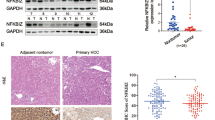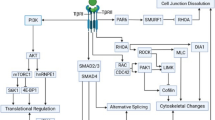Abstract
TGF-β1 has been postulated as a pro-oncogenic factor in the late step of the tumoral progression. In transformed cells, TGF-β1 enhances the capacity to degrade the extracellular matrix, cell invasiveness and epithelial-mesenchymal transition, which are crucial steps for metastasis. Urokinase-type plasminogen activator (uPA) and matrix metalloproteinase-9 (MMP-9) are critical components in cell migration and invasion induced by TGF-β1, however, the exact mechanism by which TGF-β1 regulates uPA and MMP-9 is not well elucidated so far. In the present study, we analyzed the role of ROS-NFκΒ, signal as mediator in the cell malignity enhancement by TGF-β1. We found that TGF-β1 activates NFκΒ, through Rac1-NOXs-ROS-dependent mechanism. Our results shows that TGF-β1 stimulation of uPA and MMP-9 expression involve NOXs-dependent ROS and NFκΒ, activation, demonstrated by using DPI, NOXs inhibitor, ROS scavenger N-acetylcysteine and SN50, an NFkb inhibitor. Furthermore, we found that the inhibition of ROS and NFκΒ, abrogates TGF-β1 stimulation of EMT, cell motility and invasion. Thus, ROS-NFκΒ acts as the crucial signal in TGF-β1-induced uPA and MMP-9 expression thereby mediating the enhancement of cellular malignity by TGF-β1.




Similar content being viewed by others
Abbreviations
- TGF-β1:
-
Transforming growth factor-β1
- NFκΒ:
-
Nuclear factor κ beta
- ROS:
-
Reactive oxygen species
- NOX:
-
NADPH oxidase
- uPA:
-
Urokinase type plasminogen activator
- MMP-9:
-
Matrix metalloproteinase-9
- EMT:
-
Epithelial-mesenchymal transition
References
Padua D, Massagué J (2009) Roles of TGFbeta in metastasis. Cell Res 19:89–102
Derynck R, Zhang Y (2003) Smad-dependent and Smad-independent pathways in TGF-beta family signalling. Nature 425:577–584
Hayden M, Ghosh S (2008) Shared principles in NF-kappaB signaling. Cell 132:344–362
Rayet B, Gélinas C (1999) Aberrant rel/nfkb genes and activity in human cancer. Oncogene 18:6938–6947
Naugler W, Karin M (2008) NF-kappaB and cancer-identifying targets and mechanisms. Curr Opin Genet Dev 18:19–26
Gloire G, Legrand-Poels S, Piette J (2006) NF-kappaB activation by reactive oxygen species: fifteen years later. Biochem Pharmacol 72:1493–1505
Hordijk P (2006) Regulation of NADPH oxidases: the role of Rac proteins. Circ Res 98:453–462
Hanahan D, Weinberg R (2000) The hallmarks of cancer. Cell 100:57–70
Liotta L, Kohn E (2001) The microenvironment of the tumour–host interface. Nature 411:375–379
Kim J, Yu W, Kovalski K, Ossowski L (1998) Requirement for specific proteases in cancer cell intravasation as revealed by a novel semiquantitative PCR-based assay. Cell 94:353–362
Min C, Eddy S, Sherr D, Sonenshein G (2008) NF-kappaB and epithelial to mesenchymal transition of cancer. J Cell Biochem 104:733–744
Santibáñez J, Iglesias M, Frontelo P, Martínez J, Quintanilla M (2000) Involvement of the Ras/MAPK signaling pathway in the modulation of urokinase production and cellular invasiveness by transforming growth factor-beta(1) in transformed keratinocytes. Biochem Biophys Res Commun 273:521–527
Edlund S, Landström M, Heldin C, Aspenström P (2002) Transforming growth factor-beta-induced mobilization of actin cytoskeleton requires signaling by small GTPases Cdc42 and RhoA. Mol Biol Cell 13:902–914
Santibáñez J, Guerrero J, Quintanilla M, Fabra A, Martínez J (2002) Transforming growth factor-beta1 modulates matrix metalloproteinase-9 production through the Ras/MAPK signaling pathway in transformed keratinocytes. Biochem Biophys Res Commun 296:267–273
Caulín C, Scholl F, Frontelo P, Gamallo C, Quintanilla M (1995) Chronic exposure of cultured transformed mouse epidermal cells to transforming growth factor-beta 1 induces an epithelial-mesenchymal transdifferentiation and a spindle tumoral phenotype. Cell Growth Differ 6:1027–1035
Sovak M, Arsura M, Zanieski G, Kavanagh K, Sonenshein G (1999) The inhibitory effects of transforming growth factor beta1 on breast cancer cell proliferation are mediated through regulation of aberrant nuclear factor-kappaB/Rel expression. Cell Growth Differ 10:537–544
Brar S, Kennedy T, Quinn M, Hoidal J (2003) Redox signaling of NF-kappaB by membrane NAD(P)H oxidases in normal and malignant cells. Protoplasma 221:117–127
Murillo MM, Carmona-Cuenca I, Del Castillo G, Ortiz C, Roncero C, Sánchez A, Fernández M, Fabregat I (2007) Activation of NADPH oxidase by transforming growth factor-beta in hepatocytes mediates up-regulation of epidermal growth factor receptor ligands through a nuclear factor-kappaB-dependent mechanism. Biochem J 405(2):251–259
Reuning U, Guerrini L, Nishiguchi T, Page S, Seibold H, Magdolen V, Graeff H, Schmitt M (1999) Rel transcription factors contribute to elevated urokinase expression in human ovarian carcinoma cells. Eur J Biochem 259:143–148
Yan C, Boyd D (2007) Regulation of matrix metalloproteinase gene expression. J Cell Physiol 211:19–26
Wu W (2006) The signaling mechanism of ROS in tumor progression. Cancer Metastasis Rev 25:695–705
Christiansen J, Rajasekaran A (2006) Reassessing epithelial to mesenchymal transition as a prerequisite for carcinoma invasion and metastasis. Cancer Res 66:8319–8326
Acknowledgements
Authors thank to M. Bozic and M. Stanojevic for their support, suggestions and comments. Funded by Fondo Nacional de Ciencia y Tecnologia (FONDECYT), grants 1050476 and 300045 to JFS.
Author information
Authors and Affiliations
Corresponding author
Rights and permissions
About this article
Cite this article
Tobar, N., Villar, V. & Santibanez, J.F. ROS-NFκΒ mediates TGF-β1-induced expression of urokinase-type plasminogen activator, matrix metalloproteinase-9 and cell invasion. Mol Cell Biochem 340, 195–202 (2010). https://doi.org/10.1007/s11010-010-0418-5
Received:
Accepted:
Published:
Issue Date:
DOI: https://doi.org/10.1007/s11010-010-0418-5




